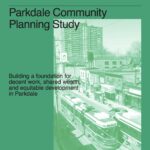Abstract
Parkdale Community Economic Development (PCED) Planning Project
Throughout 2015 & 2016 PNLT collaborated with Parkdale Peoples Economy on an 18-month community-based planning initiative in Parkdale. The goal was to develop a strategic neighbourhood plan for Parkdale. The resulting Parkdale Planning Study (2016) includes land use planning, ‘community wealth building’ strategies, neighbourhood-based economic well-being indicators, and a shared vision for decent work in Parkdale. The PCED project takes a comprehensive and participatory approach that combines community research, asset mapping, community visioning, and strategy development. The project examined a range of community assets and strategies essential for building a healthy and decent neighbourhood through seven key areas for community action and policy option:
- Social Infrastructure
- Affordable housing and land use
- Decent work and inclusive economic opportunities
- Health and food security
- Community financing
- Participatory local democracy
- Cultural development
The Full report details data analysis, needs & assets mapping results, key issues and opportunities for the seven areas of community action and policy options. The Full report also provides detailed descriptions of each direction, their rationales and inspiring examples from other neighbourhoods and cities.
Learn more about PCED and the planning process at Parkdale Community Economies
PCED WebsitePNLT contributes to local community economic development planning initiatives, consultations and visioning processes that maximize community participation and ensure the participation of low-income/marginalized people in community development.
We wish to thank a number of people and organizations for supporting the Parkdale Community Economic Development Planning project. Firstly, great thanks go to the Atkinson Foundation for making this project possible through leadership, inspiration, and financial support.
Special thanks also go to all community members, agency staff and community leaders who took the time to participate in interviews, surveys, focus groups and participatory planning workshops. The PCED project has been supported by existing collaborative initiatives funded by the Metcalf Foundation, the Ontario Trillium Foundation, the Echo Foundation, and the Catharine Donnelly Foundation. We are also grateful to Richard Maaranen from the University of Toronto’s Neighbourhood Change Research Partnership (NCRP) project and Heath Priston from the City of Toronto’s Social Development Finance and Administration for providing data for the project.
